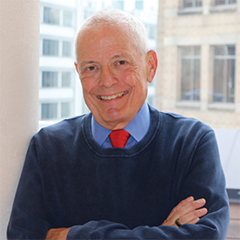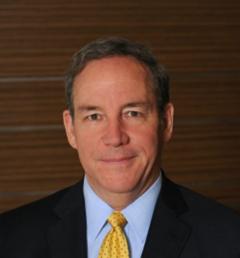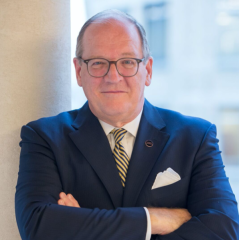With decades of experience in diplomacy, negotiations, national security and leadership, retired U.S. State Department Ambassador Edward O’Donnell, retired Lt. Gen. Benjamin Freakley and Ambassador-in-Residence Michael C. Polt joined together in the pursuit of creating a new initiative that embodies the innovative spirit of Arizona State University.
The three practitioners worked with the University Design Institute to brainstorm how they could each contribute their knowledge to ASU, resulting in the recent launch of the Leadership, Diplomacy and National Security Lab.
“The launch of the LDNS Lab demonstrates the opportunities ASU can offer our community by leveraging the university’s presence in Washington, D.C., and Phoenix. Freakley, Polt and O’Donnell each have decades of strategic knowledge and experience that our students and faculty can learn from to further engage with issues of importance locally, nationally and internationally,” said ASU President Michael Crow. "We are excited to give learners this chance to engage with and learn from the most experienced and distinguished diplomacy and leadership experts our university has to offer.”
Students, faculty and staff will have the opportunity to interact directly with each expert through the lab, and educational opportunities will include the new ASU Global Leaders Program, a leadership development, training and education program set; tailored short courses and workshops; a semesterlong ASU Policy Design Studio focused on serving as a U.S. Country Team in a foreign country; as well as degrees and certificates currently being developed.
“The LDNS Lab will provide unique opportunities for students, faculty, staff and ASU affiliates to learn more about international affairs and diplomacy, character-driven leadership and national security through the lens of a career ambassador, retired negotiating ambassador and a retired U.S. Army lieutenant general,” Director Kathy Cook said. “Already this year, the lab has collaborated with Barrett, The Honors College; Thunderbird School of Global Management; Sandra Day O’Connor College of Law and others to develop leadership workshops, diplomatic internships, and launch the ASU Global Leaders program.”
While the lab lives within The College of Liberal Arts and Sciences, its impact and access is intended to be far-reaching across the full range of university enterprises.
Meet the lab practitioners
Ambassador Edward O’Donnell

O’Donnell, professor of practice in the School of Politics and Global Studies, retired from the U.S. foreign service in 2007 after 33 years in Latin America, German-speaking Europe, Washington, D.C., and most recently Afghanistan. He served in Germany, Austria, Panama, Colombia and Paraguay, as charge, deputy chief of mission, consul general (principal officer), economic counselor and commercial attaché. In Washington, D.C., he was a negotiating ambassador concentrating on Holocaust issues, a democratic charter for the Americas and civil aviation rights. He also retired from the U.S. Army Reserve as a colonel in military intelligence with assignments as a foreign area officer.
In the Leadership, Diplomacy and National Security Lab, O’Donnell heads the undergraduate and graduate educational programs. His vision is to help students achieve their goals and become aware of the many opportunities they have regarding internships, fellowships and long-term career options. As a mentor, O’Donnell said he always tells students to look broadly at their path ahead.
“There are a lot of opportunities out there. Some students are already centered on working for the government or NGOs, some are not sure and considering law school or academics. So I say, explore all those avenues; don't restrict yourself. But then have a plan, have a clear path to what you want to be doing five or 10 years from now.”
He said he can imagine how the idea of finding and securing internships or work experience in Washington, D.C., can be intimidating for students, especially those residing in Arizona, far from the Capitol.
“The three of us — Gen. Freakley, Ambassador Polt and myself — have plenty of contacts throughout Washington, D.C., in government, NGOs, think tanks around town, friends we've dealt with over the years, and we know how to plug in to that sort of environment,” O’Donnell said. “I think that's where we can help and understand government programs that ASU students can benefit from.”
Lt. Gen. Benjamin Freakley

Lt. Gen. Freakley serves as special adviser to ASU President Michael Crow for leadership initiatives, as well as a professor of practice for leadership. He retired from the U.S. Army after more than 36 years of active duty military service and served as commanding general, U.S. Army Accessions Command, at the time of his retirement. Freakley was responsible for worldwide recruiting for the active duty and reserve components as well as overseeing the nation’s junior and college ROTC programs. He led both U.S. and allied forces in combat on three separate combat deployments. Freakley’s awards include the Distinguished Service Medal, Legion of Merit, Bronze Star for Valor and ARCOM for Valor.
Freakley said he was drawn to ASU by President Crow’s leadership and vision for the New American University as well as ASU’s charter.
“Our global reach, our innovation, our entrepreneurial spirit, there’s a constant drive to create new ideas, new work, new education and empower young people. What kept me in the Army was working with young people — most of the soldiers are 18 to 25 years old and I just loved being around young people,” he said. “At ASU, we have tremendous students, very focused, impactful driven women and men from all backgrounds.”
The lab was created with an idea of supporting issues and trying to solve complex problems related to leadership diplomacy and national security. Freakley said the creation of the lab also helps increase access and establish connections between students and experienced professionals.
“I want our students to leave ASU totally confident and prepared to enter the workforce and to make a difference straight away,” he said.
Freakley invites anyone at ASU interested in the lab to connect with them to find out how they can get involved or help shape its future.
“If there's an area of exploration, an area of study, an area of interest for our students, our faculty and staff – bring it to us, let's work on it together.”
Ambassador-in-Residence Michael Polt

Polt, ASU’s ambassador-in-residence and a professor of practice, served as senior director at the McCain Institute for International Leadership before joining The College in 2020. Prior to his career at ASU, Polt worked in diplomacy for 35 years, including assignments as ambassador to the Republic of Estonia, Serbia and Montenegro as well as principal deputy and acting assistant secretary of state for legislative affairs in the Powell and Clinton State Departments. Polt also served as U.S. minister and deputy chief of mission in Germany and deputy chief of mission and chargé d'affaires in Switzerland. Polt has been the repeat recipient of the Presidential Meritorious Service Award and numerous Department of State Meritorious and Superior Honor Awards for Outstanding Policy Leadership, Management, Crisis Performance and Political Analysis.
In his new role as ambassador-in-residence as well as in the lab, Polt plans to serve as an interdisciplinary resource accessible to colleges and students across ASU. He plans to host virtual office hours to help advise students about career opportunities in international affairs, diplomacy and more, and will use his personal and professional experiences to help educate students on the importance of foreign affairs and having diverse representation in policymaking. Polt will also host a new ASU Ambassador Roundtable for foreign ambassadors to the United States in Washington, D.C., to introduce ASU’s international programming to the international diplomatic circuit.
READ MORE: Polt talks about new role, shares advice for students considering foreign affairs
“The American people should be connected to U.S. foreign policy and I want to do my part to help. I think that being in a massive university like ASU gives me a unique vantage point to go ahead and make that connection,” he said. “I want to work on broadening the diversity of people who participate in U.S. foreign policy development and implementation. I want people who are not traditional stakeholders, who would never think of foreign affairs as affecting them and bring them into the foreign policy process so they can enrich our foreign policy with their diversity of vantage points."
Learn more about the lab by visiting its website.
More Law, journalism and politics

Arizona secretary of state encourages students to vote
Arizona Secretary of State Adrian Fontes looked right and left, taking in the more than 100 students who gathered to hear him speak in room 103 of Wilson Hall.He then told the students in the Intro…

Peace advocate Bernice A. King to speak at ASU in October
Bernice A. King is committed to creating a more peaceful, just and humane world through nonviolent social change.“We cannot afford as normal the presence of injustice, inhumanity and violence,…

CNN’s Wolf Blitzer to receive 41st Walter Cronkite Award for Excellence in Journalism
Wolf Blitzer, the longtime CNN journalist and anchor of “The Situation Room With Wolf Blitzer,” will accept the 41st Walter Cronkite Award for Excellence in Journalism, Arizona State University has…
